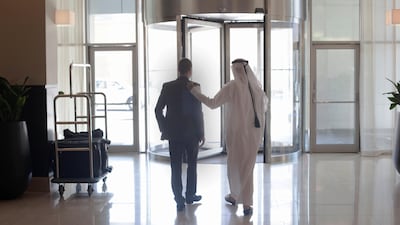Could you please clarify the following queries related to reclaiming input VAT: is it allowed for companies to claim VAT on hotel bookings done for trainers and trainees? Further, is it allowed to claim VAT on non-entertainment expenses if we can recognise those from the main hotel invoice (where the VAT is charged for entertainment and non-entertainment)? BL, Dubai
This area of the VAT legislation is covered in the Decree Law, the Executive Regulations and also in a separate Public Clarification.
Article 54 of the Decree Law covers the criteria for input tax recovery and Article 53 of the Executive Regulations sets out specific types of expenditure where input tax cannot be recovered. This includes costs relating to entertainment, motor vehicles available for private use and goods or services provided to employees for their personal benefit.
The FTA very helpfully also published Public Clarification number 5 titled "Non-recoverable input tax – entertainment services" which can be found on the FTA portal. What this clarification says is that VAT incurred on costs which are for a genuine business purpose, or which are incidental to a business purpose, shall be recoverable.
You don’t specify in your query whether the trainees are internal to your organisation or external. For internal trainees, reasonable hotel costs for trainers and trainees should fall under the definition of genuine business purpose, and VAT would be recoverable. The clarification further explains that if hospitality provided becomes an end in itself and could be construed as the reason for attending an event, such costs will be classified as entertainment and the VAT incurred is not recoverable. As long as the hotel accommodation you are providing is reasonably priced and not excessive, then you can reclaim the VAT.
Similarly, if you are providing meals for trainers and trainees similar criteria would apply. For example, you would not be able to reclaim the VAT if you took them out for an evening meal, away from the hotel as this would fall under the category of entertaining. If you allowed the participants to charge movies or a minibar to their room account, the VAT on these costs would not be recoverable.
If the participants are external to your organisation, then the recoverability would depend on whether you were charging them a commercial fee for the training. If a fee is charged, then input tax would be recoverable on the basis that the expense is attributable to making taxable supplies. If you didn’t charge a fee to the external trainees, then input tax recovery would not be allowed. Similarly, if you charged just a nominal fee then the input tax would not be recoverable.
When you read the Clarification for yourself you will see that this is a tax area open to some interpretation as to what is reasonable and simple hospitality. The guide states that if there is any uncertainty as to whether what you are providing would be classified as in the normal course of business, then you should not reclaim the input VAT.
A customer has made an advance payment to us and is asking for a VAT invoice. We usually issue VAT invoices and account for the VAT only when we deliver the goods. Can you advise me what we should do? RP, Abu Dhabi
The date of supply is a very important concept in VAT legislation as it dictates in which VAT period you should account for output VAT on your sales and when your customer can reclaim input VAT on his purchases. The rules are included in Articles 25 and 26 of the Decree Law and Article 19 of the Executive Regulations. To simplify the legislation a little, the timing of accounting for VAT should be the earlier of the date of the supply of the goods or services, the date of raising the tax invoice, or the date of receipt of payment. In this case, therefore, the date of supply would be when you received the payment.
In theory you could account for the output VAT on the advance received without raising a sales invoice, but this is significantly more complicated and prone to error than raising an invoice in your accounting system where the VAT will be automatically recorded for you. I would agree to your customer’s request and send him a VAT invoice for the advance. If needed you could then issue a second invoice once you have delivered the good or service and require the final payment.
Lisa Martin, a chartered accountant with more than 20 years of commercial finance experience, is the founder of accounting, auditing and VAT consultancy, The Counting House. Email any VAT queries to pf@thenational.ae

